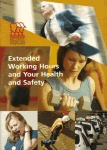Courses
This course is no longer conducted by MARCSTA (information for historical purposes only)
Extended Working Hours and Your Health and Safety

View Pre-Course Information

This course is designed for workers and employers everywhere as a basic introduction to managing extended working hours.
Much of the content of the program calls for input and discussion involving candidates.
The content of the course has been grouped under six main elements:
-
Our Biological Clocks.
-
Sleep.
-
Sleep Deprivation.
-
Staying Safe and Alert.
-
Maintaining Good Health.
-
Family and Social Consequences.
This program has been developed to enable both employers and employees to meet:
-
the duty of care obligations contained in the occupational safety and health legislation prevailing in respective workplaces; and
-
the Working Hours Code of Practice.
Control measures listed in the Working Hours Code of Practice (Commission for Occupational Safety and Health WA) MIAC, to manage risks resulting from extended working hours or shift work arrangements applying in many workplaces, include providing information and training to managers, supervisors and employees.
The course covers the skills and knowledge required to apply fatigue management strategies, including identifying and acting upon signs of fatigue and implementing appropriate strategies to minimise fatigue during work activities.
Elements and Performance Criteria
+ expand for more
Program Content
+ expand for more